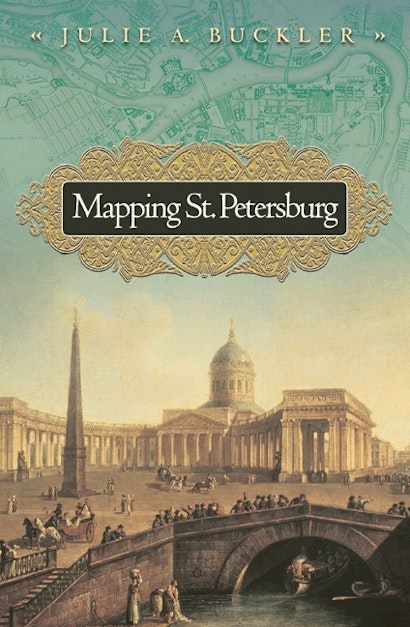Pushkin’s palaces or Dostoevsky’s slums? Many a modern-day visitor to St. Petersburg has one or, more likely, both of these images in mind when setting foot in this stage set-like setting for some of the world’s most treasured literary masterpieces. What they overlook is the vast uncharted territory in between. In Mapping St. Petersburg, Julie Buckler traces the evolution of Russia’s onetime capital from a “conceptual hierarchy” to a living cultural system—a topography expressed not only by the city’s physical structures but also by the literary texts that have helped create it.
By favoring noncanonical works and “underdescribed spaces,” Buckler seeks to revise the literary monumentalization of St. Petersburg—with Pushkin and Dostoevsky representing two traditional albeit opposing perspectives—to offer an off-center view of a richer, less familiar urban landscape. She views this grand city, the product of Peter the Great’s ambitious vision, not only as a geographical entity but also as a network of genres that carries historical and cultural meaning.
We discover the busy, messy “middle ground” of this hybrid city through an intricate web of descriptions in literary works; nonfiction writings such as sketches, feuilletons, memoirs, letters, essays, criticism; and urban legends, lore, songs, and social practices—all of which add character and depth to this refurbished imperial city.
Awards and Recognition
- Winner of the 2005-06 Aldo and Jeanne Scaglione Prize for Studies in Slavic Languages and Literatures
Julie Buckler is Professor of Slavic Languages and Literatures at Harvard University. She is the author of The Literary Lorgnette: Attending Opera in Imperial Russia.
"[Mapping St. Petersburg] challenges the enduring myth of the city's uniqueness by exploring its ordinariness, as depicted in "middlebrow" fiction and non-fictional sources, uncovering a rich body of material that in itself should prove invaluable to researchers in a number of disciplines."—Lindsey Hughes, Times Literary Supplement
"[Buckler] conveys very effectively what many writers have felt about the city—its elusively cerebral characters, its insubstantiality verging on evanescence."—Catriona Kelly, Russian Review
"[Buckler] offers a useful, thematically organized synthesis of interesting writing on St. Petersburg, many of them otherwise inaccessible to anglophone readers."—Stephen Lovell, American Historical Review
"[A] brilliant and intriguing exercise in urban textology. . . . [Buckler] conveys the sense of complexity and mystery that defines, and always has defined, Saint Petersburg."—Cynthia Hyla Whittaker, Bookforum
"In Mapping St. Petersburg, Julie Buckler rewrites the exclusionary ideology of classicism that has dominated pictorial and verbal discourses on Petersburg from Pushkin's 'Bronze Horseman' to the Petersburg Tricentenary of 2003. Meticulously researched and illustrated, deftly theorized, and vividly written, the book presents an exhilaratingly concrete study of Petersburg urban design and architectural history, focusing on the many 'eclectic' rental buildings, markets, cemeteries, and places of amusement that constitute a physical testimony to the aesthetic tastes and mixed social experience inscribed in them. Buckler explores the rich array of lowbrow and middlebrow writing on Petersburg that furnishes the forgotten matrix of urban folklore on which the Russian realist novel drew. Her intellectual mission: to restore to visibility the elided 'middle' of Russian society and taste that has been so carefully expunged from the cultural record and has only recently become a focus of interest for Russian imperial historians and students of cityscape as embodied myth."—Monika Greenleaf, Stanford University
"This is a fascinating book. It is beautifully written and contains countless original details, insights, and observations. The rich array of materials offers a great deal of new information about and analysis of the cultural history of St. Petersburg. Buckler's approach represents a major contribution not only to Russian studies and comparative literature but also to cultural geography, history, and urban anthropology."—Alexei Yurchak, University of California, Berkeley
"This strong, timely book celebrates the three-hundredth anniversary of St. Petersburg in a manner that is genuinely—not just rhetorically—interdisciplinary. In this exotic ex-centric city, with its autoreferential literary legacy and its 'anti-Moscow' mystique, the spatial and verbal arts came together concretely in a monolithic myth of violent beginnings and apocalyptic ends. So monolithic was this myth that it cultivated its own areas of blindness. Buckler brings these blind spots back into the light."—Caryl Emerson, Princeton University

